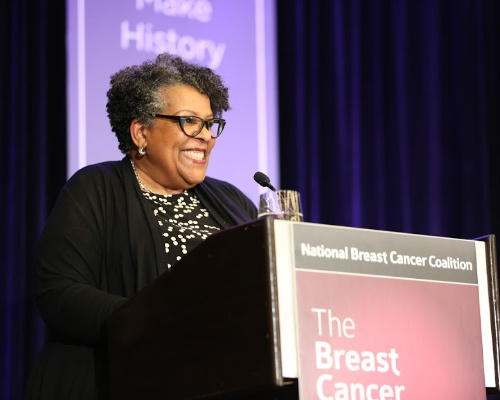Location: Washington, DC
Topic: Advocacy

When Wanda was diagnosed with breast cancer in 2006, she had just lost a childhood friend to the disease two months earlier. Learning that so many African American women die from breast cancer, she decided to do what she could to make a difference. She gave up her career in the corporate world and became actively involved in research at Georgetown University focused on addressing health disparities primarily as it relates to African American women. In various roles, she supported research studies as both a Survivor Coach, member of a grant’s Advisory Board, and a champion for minority recruitment.
In 2010, Wanda attended her first National Breast Cancer Coalition (NBCC) Advocacy Training Conference. Later that year, she attended Project LEAD® and Project LEAD® Clinical Trials. She’s been a regular participant of NBCC Summits and Lobby Days since. She’s a trained Team Leader and a strong voice for NBCC public policy initiatives. NBCC Lobby Days are important to Wanda. In her words, “I believe this level of action is especially poignant for women since we fought for the right to vote. And when it comes to lobbying and being involved in advocacy, I view it the same way. It is not just my right; it is my responsibility. No one knows why we were ‘chosen’ to receive a diagnosis of breast cancer. But one thing is certain—we made a choice to fight. And we have a way to make our voices heard. We want to affect policymakers, and the best weapons we have are our voices, which NBCC trains us to amplify for impact.”
Nominated by NBCC, Wanda was recognized as a Champion of Change for Breast Cancer by the White House in 2011. She is a Consumer Reviewer for the Department of Defense (DoD) Congressionally Directed Medical Research Programs (CDMRP), and served as a symposium Co-Chair at the DOD Breast Cancer Research Program (BCRP) Era of Hope Conference in 2011. Currently, Wanda is vice president of NBCC’s board of directors, a member of its executive committee, and a member of the Georgetown University Breast Cancer Patient Advocacy Group. Wanda has co-authored a paper for Psychoncology (January 2010), as well as a chapter in a book by the American Cancer Society In Cancer Disparities: Causes and Evidence-Based Solutions (2011). A compassionate advocate, Wanda’s commitment to saving lives and ending breast cancer is apparent in all that she does. And she does it all so very well.